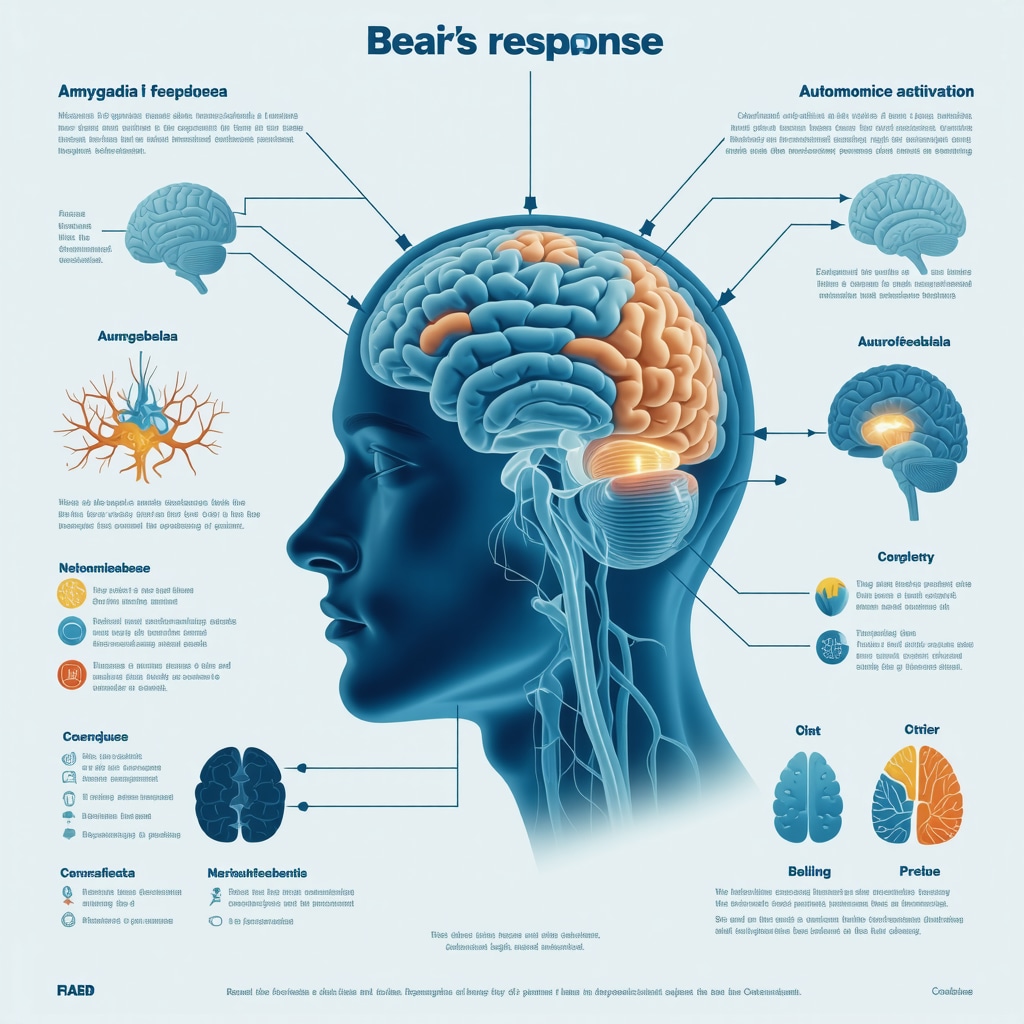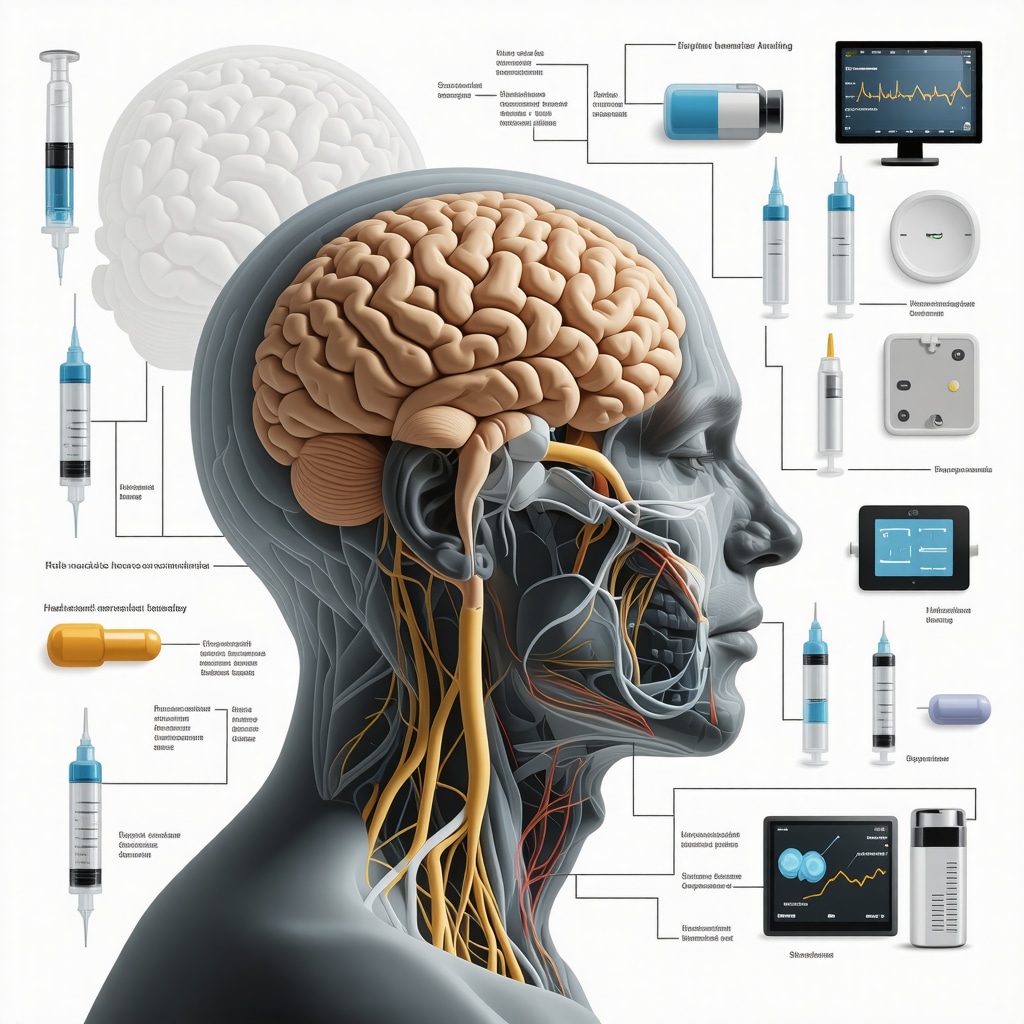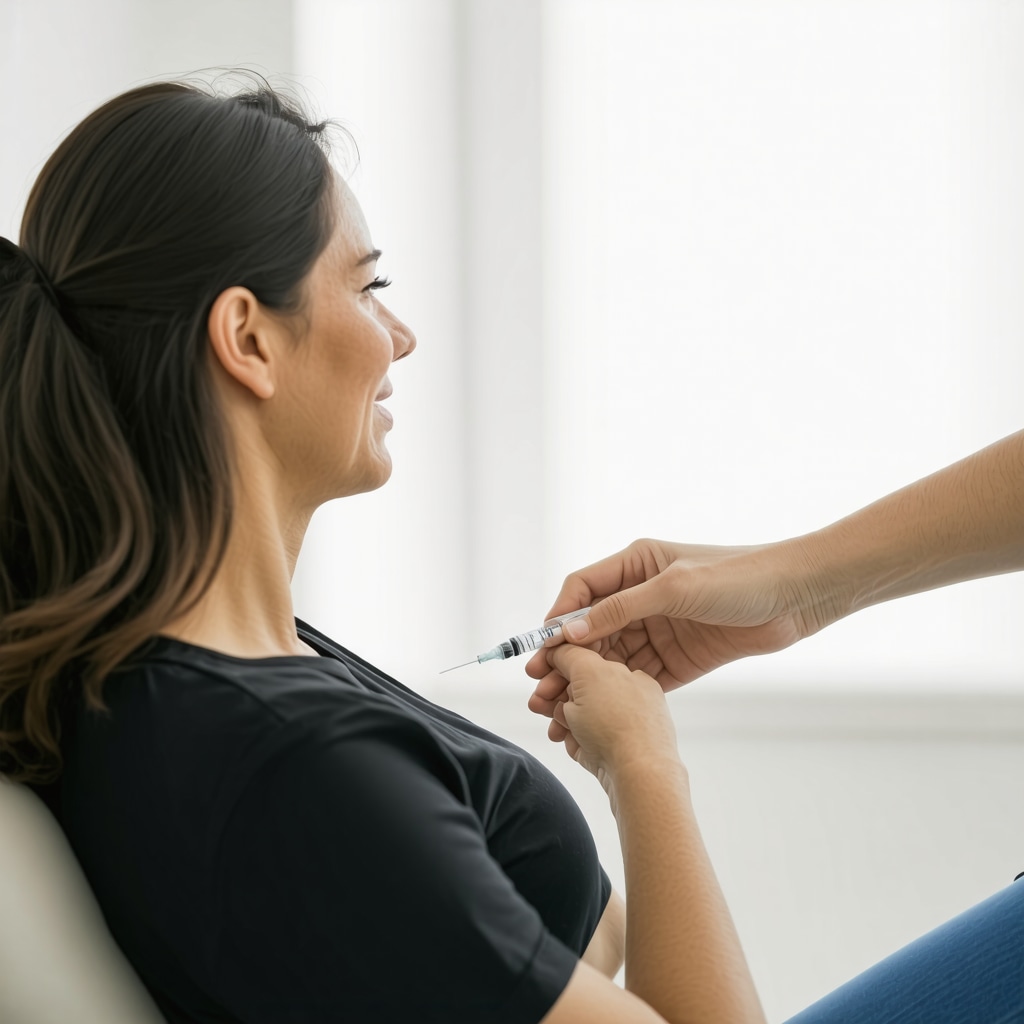Transforming Fear into Confidence: Understanding Injection Anxiety in Weight Loss
Embarking on a prescription injection weight loss journey brings promising benefits; however, the anxiety associated with injections can be a significant barrier. Injection anxiety, characterized by fear or discomfort around self-administering medication, often stems from needle phobia or unfamiliarity with the process. Recognizing this emotional hurdle is the first step toward managing it effectively and ensuring consistent use of weight loss injections such as semaglutide or tirzepatide.
Mind Over Matter: Psychological Strategies to Ease Injection Stress
Practical mental techniques can profoundly reduce injection anxiety. Deep breathing exercises, visualization of positive outcomes, and cognitive behavioral approaches help reshape negative associations with injections. For example, practicing controlled breathing before and during injection can lower heart rate and induce calmness, facilitating smoother administration. Additionally, gradual exposure—starting with holding the injection device without administering the shot—helps desensitize fear responses over time.
Crafting Your Comfort Zone: Physical Tips for Managing Injection Anxiety
Creating a comfortable physical environment is equally critical. Selecting a quiet, well-lit space and using distraction tools such as music or engaging videos can divert attention from the injection. Applying a cold pack or numbing cream to the injection site beforehand minimizes pain sensations, reducing anticipatory anxiety. Rotating injection sites as advised not only optimizes absorption but also prevents localized discomfort and bruising, which can fuel apprehension.
How Can Proper Injection Technique Alleviate Anxiety and Improve Weight Loss Outcomes?
Expert injection technique is paramount. Using the correct needle size, angle, and depth reduces pain and tissue trauma. Proper skin pinching and slow injection speed further minimize discomfort. Mastery of technique builds confidence, turning injections from a dreaded task into a routine part of a weight loss regimen. Clinicians often recommend training sessions or instructional videos to reinforce best practices, which can significantly ease anxiety.
Leveraging Support Networks: When and How to Seek Help
Injection anxiety is a common challenge, and seeking support is a proactive strategy. Healthcare providers can offer guidance tailored to individual needs, including referral to behavioral therapy if anxiety is severe. Joining support groups or online communities focused on injectable weight loss treatments can provide shared experiences and encouragement, fostering a sense of belonging and motivation.
For more expert advice on managing injection anxiety and optimizing your weight loss injections, explore resources like doctor-approved weight loss advice on coping with injection anxiety.
Embracing Innovation: Technological Advances to Reduce Injection Fear
Emerging technologies such as needle-free injectors and auto-injectors are revolutionizing how patients experience weight loss injections. These devices often reduce pain and simplify administration, effectively lowering anxiety barriers. Staying informed about such options and discussing them with your healthcare provider can provide personalized solutions.
According to the Anxiety and Depression Association of America, needle phobia affects approximately 10% of the population, underscoring the importance of tailored coping mechanisms (source: ADA Anxiety on Needle Phobia).
If you have experiences or tips on managing injection anxiety, feel free to share your story with us and join the conversation to empower others on their weight loss journey.
My Personal Journey with Injection Anxiety and Weight Loss
When I first started using injectable medications like semaglutide for weight loss, I felt a knot of anxiety every time I faced the needle. It wasn’t just about the physical sensation, but the mental buildup—the anticipation made the whole process intimidating. Over time, I realized that managing this anxiety wasn’t just about the injection itself but about reshaping my whole approach. I began to see injections not as obstacles but as empowering tools in my journey.
Incorporating Routine and Mindfulness to Ease the Process
One strategy that made a remarkable difference was creating a consistent injection routine paired with mindfulness. Choosing a specific time of day and a comfortable spot not only helped me mentally prepare but also made the process predictable, reducing stress. I’d take a few moments to breathe deeply and visualize the positive impact of the medication on my health and energy. This mental framing transformed the experience from a dreaded task to a meaningful self-care moment.
Could Changing Your Perspective on Injections Help You Embrace Your Weight Loss Journey?
This question became a turning point for me. Instead of fixating on fear, I focused on the benefits and the progress I was making. Of course, the physical techniques mattered too—pinching the skin gently, injecting slowly, and rotating sites minimized discomfort. And when I felt overwhelmed, reaching out to online communities and healthcare providers gave me reassurance and practical tips. For anyone navigating similar feelings, it’s comforting to know you’re not alone.
Balancing Medication with Lifestyle: A Holistic Approach
While injections play a critical role, pairing them with lifestyle changes like balanced nutrition and regular exercise amplifies results significantly. I remember reading insights on effective use of tirzepatide combined with exercise, which emphasized how physical activity complements medication by boosting metabolism and appetite control. This holistic view encouraged me to treat weight loss as a comprehensive journey rather than a quick fix.
Learning from Experts: The Importance of Medical Guidance
Throughout this experience, I leaned heavily on the advice of healthcare professionals. They helped me tailor injection plans to my needs and manage any side effects, ensuring safety and effectiveness. If you’re considering or currently using prescription injections, I highly recommend exploring resources like medically supervised weight loss custom injection plans to optimize your approach and troubleshoot challenges.
Remember, managing injection anxiety and succeeding in your weight loss journey is a gradual process that benefits greatly from patience, education, and support. If you’ve had experiences with injection anxiety or found techniques that helped you, I’d love to hear your story. Feel free to share your experiences or connect with others navigating similar paths.
Integrative Neuropsychological Approaches to Injection Anxiety in Weight Loss Therapy
Delving deeper into the neuropsychological mechanisms underlying injection anxiety reveals a complex interplay between conditioned fear responses and the brain’s pain modulation pathways. Injection anxiety often triggers the amygdala, the brain’s fear center, which can amplify perceived pain and heighten stress hormones like cortisol. Advanced techniques such as neurofeedback and mindfulness-based stress reduction (MBSR) have shown promising results by helping individuals retrain their brain’s response to needle-related stimuli, leading to diminished anxiety and improved adherence to injectable weight loss therapies.
Neurofeedback, for instance, uses real-time EEG monitoring to help patients recognize and modulate anxiety-related brainwave activity. This biofeedback loop empowers users to reduce hyperarousal states before injections, thus lowering anticipatory anxiety. Complementing this, MBSR encourages patients to cultivate non-judgmental awareness of bodily sensations during injections, reducing the emotional charge associated with needle use. These integrative approaches provide a sophisticated toolkit beyond traditional cognitive behavioral therapy, particularly useful for those with entrenched needle phobia.
What Role Does the Autonomic Nervous System Play in Injection Anxiety, and How Can It Be Modulated?
The autonomic nervous system (ANS), comprising sympathetic and parasympathetic branches, governs involuntary physiological responses to stress, including the fight-or-flight reaction commonly activated during injections. Hyperactivation of the sympathetic nervous system can cause increased heart rate, sweating, and vasoconstriction, all of which exacerbate injection discomfort and anxiety.
Techniques aimed at modulating the ANS include paced diaphragmatic breathing, vagus nerve stimulation (VNS), and progressive muscle relaxation (PMR). Paced breathing at a rate of approximately 6 breaths per minute can shift ANS balance towards parasympathetic dominance, promoting relaxation. Emerging research into non-invasive VNS devices shows potential for mitigating anxiety by stimulating the vagus nerve to induce calming effects. PMR systematically reduces muscle tension, interrupting the feedback loop between anxiety and physical discomfort during injections.
These physiological modulation strategies, when practiced consistently, can transform the injection experience from a source of dread to a manageable, even neutral, event—thereby enhancing treatment adherence and weight loss outcomes.
Pharmacological Adjuncts and Topical Innovations: Minimizing Pain and Psychological Barriers
Beyond psychological and behavioral interventions, pharmacological adjuncts offer a complementary path to alleviate injection-related discomfort. For example, topical anesthetics like lidocaine-prilocaine creams applied 30-60 minutes prior to injection can significantly reduce needle pain and thus the anticipatory anxiety linked to it. Additionally, emerging formulations such as cryoanesthetics that combine cooling with analgesia show promise in clinical trials for enhancing patient comfort.
Another innovative strategy is the use of low-dose oral anxiolytics or beta-blockers under strict medical supervision to attenuate acute injection-related anxiety episodes. While not suitable for long-term use, these agents can be invaluable during initiation phases of weight loss injection regimens for patients with severe needle phobia.
Moreover, advances in injection device technology, including micro-needle patches and jet injectors, aim to minimize skin penetration trauma. These innovations not only reduce physical pain but also psychologically reframe the injection as less invasive, thus diminishing fear responses over time.
Data-Driven Insights: Monitoring and Adapting Strategies for Sustained Success
Leveraging digital health tools to monitor injection anxiety and adherence can provide personalized insights and facilitate timely interventions. Mobile apps equipped with mood tracking, guided relaxation exercises, and injection scheduling reminders empower patients to engage actively with their treatment process. Integration of biometric sensors measuring heart rate variability (HRV) during injections offers objective data on physiological stress levels, enabling clinicians to tailor anxiety management protocols dynamically.
According to a 2023 study published in the JAMA Network Open, patients using digital behavioral interventions demonstrated a 30% greater reduction in injection-related anxiety compared to controls, highlighting the importance of technology-supported care models.
For healthcare practitioners and patients eager to explore these advanced strategies, collaborating with interdisciplinary teams including psychologists, pharmacists, and technology specialists is key to optimizing injection experience and maximizing weight loss efficacy.
Interested in deepening your understanding of sophisticated anxiety management techniques? Explore our expert resources and join specialized workshops designed to empower you through every step of your weight loss injection journey.

Neurobiological Insights: Understanding the Brain’s Role in Injection Anxiety
Injection anxiety is not merely a psychological phenomenon but a deeply rooted neurobiological response. The amygdala, hippocampus, and prefrontal cortex orchestrate fear conditioning and memory related to needles, often triggering heightened stress responses. Understanding these neural circuits enables clinicians and patients to adopt targeted interventions such as neurofeedback and mindfulness-based stress reduction (MBSR), which can recalibrate maladaptive fear pathways and foster resilience during injectable weight loss treatments.
How Can Autonomic Nervous System Modulation Optimize Injection Experiences?
The autonomic nervous system (ANS) plays a pivotal role by mediating involuntary reactions to injection stress, including elevated heart rate and perspiration. Techniques such as paced diaphragmatic breathing, vagus nerve stimulation, and progressive muscle relaxation have demonstrated efficacy in shifting ANS balance toward parasympathetic dominance, thereby mitigating anxiety-induced physiological symptoms. Regular practice of these methods can transform the injection encounter from a trigger of distress to a controlled, calm experience.
Pharmacological and Technological Innovations: Beyond Conventional Anxiety Management
Pharmacological adjuncts, including topical anesthetics like lidocaine-prilocaine and emerging cryoanesthetic formulations, effectively reduce nociceptive input and associated anticipatory anxiety. Additionally, carefully supervised use of low-dose anxiolytics or beta-blockers during initial injection phases can ease acute distress in patients with severe needle phobia. Parallel to pharmacology, advancements in injection devices—such as micro-needle patches and needle-free jet injectors—minimize tissue trauma and psychologically reframe injections as less invasive, fostering greater acceptance and adherence.
Harnessing Digital Health: Personalized Monitoring for Sustained Anxiety Relief
Integrating digital tools with behavioral strategies offers a dynamic approach to managing injection anxiety. Mobile applications featuring mood tracking, guided relaxation, and injection scheduling empower patients to engage actively with their treatment. Biometric sensors assessing heart rate variability during injections provide objective stress metrics, enabling tailored interventions. A 2023 JAMA Network Open study highlights a 30% anxiety reduction in patients utilizing digital behavioral interventions, underscoring the transformative potential of technology-enhanced care.

Collaborative Care: The Imperative of Interdisciplinary Support
Optimizing injection experiences necessitates collaboration across medical, psychological, and technological domains. Psychologists contribute cognitive and neurobehavioral expertise, pharmacists advise on pharmacological adjuncts, and technologists develop patient-centered digital tools. This synergy ensures comprehensive support tailored to individual needs, ultimately enhancing treatment adherence and weight loss outcomes.
If you are ready to deepen your mastery of injection anxiety management and leverage cutting-edge strategies, explore our specialized workshops and expert resources designed to empower you at every step of your injectable weight loss journey.
Frequently Asked Questions (FAQ)
What causes injection anxiety in patients using weight loss medications?
Injection anxiety arises from a combination of psychological fear (needle phobia), conditioned responses to pain or discomfort, and neurobiological factors involving the brain’s fear and pain pathways. Anticipation of pain, past negative experiences, and lack of familiarity with injection techniques contribute significantly to this anxiety.
How can I effectively reduce pain associated with weight loss injections?
Using proper injection techniques—including correct angle, needle size, and site rotation—minimizes tissue trauma. Applying topical anesthetics like lidocaine-prilocaine creams or cryoanesthetics before injections can numb the area. Additionally, slow administration and physical methods like cold packs help reduce pain perception and associated anxiety.
Are there psychological methods to manage injection anxiety?
Yes, cognitive behavioral therapy, mindfulness-based stress reduction (MBSR), deep breathing exercises, and gradual exposure techniques have proven effective. These approaches help reframe negative associations, regulate physiological stress responses, and build confidence in self-injection routines.
What role does the autonomic nervous system play in injection anxiety?
The autonomic nervous system mediates involuntary stress responses such as increased heart rate and sweating during injections. Modulating it through paced diaphragmatic breathing, vagus nerve stimulation, and progressive muscle relaxation can shift the balance toward parasympathetic dominance, promoting relaxation and reducing anxiety symptoms.
Can technology help me manage injection anxiety?
Absolutely. Digital health tools, including mobile apps with mood tracking and guided relaxation, alongside biometric sensors monitoring heart rate variability, provide real-time feedback and personalized support. Emerging devices like needle-free injectors and auto-injectors also reduce pain and fear, facilitating better adherence.
When should I seek professional support for injection anxiety?
If anxiety significantly impairs your ability to self-administer injections or causes severe distress, consulting healthcare providers is essential. They can offer behavioral therapy referrals, pharmacological adjuncts, and tailored injection training to help overcome these challenges.
Are pharmacological aids safe for reducing injection anxiety?
Topical anesthetics are generally safe and widely recommended. Low-dose anxiolytics or beta-blockers may be used briefly under medical supervision, particularly during treatment initiation, but are not suitable for long-term management. Always consult a healthcare professional before using pharmacological aids.
How important is lifestyle integration alongside injection therapy?
Weight loss injections are most effective when combined with balanced nutrition and regular physical activity. This holistic approach enhances medication benefits, supports metabolic health, and contributes to sustainable weight loss outcomes.
Can neurofeedback help with needle phobia related to weight loss injections?
Yes, neurofeedback helps patients identify and modulate anxiety-related brainwave patterns, reducing hyperarousal and fear responses associated with needles. This technique, combined with mindfulness, offers advanced neuropsychological tools for managing injection anxiety.
What are the latest innovations in injection devices to reduce anxiety?
Innovations such as micro-needle patches, jet injectors, and needle-free devices minimize skin penetration and pain. These technologies reframe the injection experience as less invasive, lowering psychological barriers and improving patient acceptance.
Trusted External Sources
- Anxiety and Depression Association of America (ADAA) – Provides authoritative information on needle phobia, its prevalence, and evidence-based anxiety management strategies relevant to injection therapy.
- JAMA Network Open – Publishes peer-reviewed studies on behavioral interventions and digital health tools that quantitatively demonstrate reductions in injection-related anxiety.
- American Society of Bariatric Physicians (ASBP) – Offers clinical guidelines on injectable weight loss medications, proper injection techniques, and holistic patient care.
- National Institute of Mental Health (NIMH) – Delivers comprehensive research on neurobiological mechanisms of anxiety and advanced therapeutic approaches like neurofeedback and MBSR.
- International Journal of Obesity – Features cutting-edge research on pharmacological adjuncts and technological innovations in obesity treatment, including injection device advancements.
Conclusion
Injection anxiety is a multifaceted challenge intricately tied to neurobiological, psychological, and physiological factors, yet it can be effectively managed through a blend of evidence-based strategies. Mastering proper injection techniques, employing psychological interventions such as mindfulness and neurofeedback, utilizing pharmacological adjuncts, and embracing technological innovations collectively empower patients to overcome fear and optimize their weight loss journey. Integrating lifestyle modifications and seeking interdisciplinary support further enhances treatment efficacy and sustainability.
By adopting a personalized, informed approach to injection anxiety, individuals can transform apprehension into confidence, ensuring adherence and maximizing the benefits of injectable weight loss therapies. We encourage you to apply these expert insights, engage with supportive communities, and explore advanced resources to thrive in your weight loss endeavors. Share your experiences, comment with questions, and continue learning to stay empowered every step of the way.


I really appreciate the detailed exploration of injection anxiety presented here. From personal experience, the psychological aspect of fearing the needle was more challenging for me than the physical pain. What helped me the most was the gradual exposure technique mentioned—just holding the injection pen and mentally preparing without administering initially. Pairing that with deep breathing exercises allowed me to reduce my stress significantly. I also found that creating a consistent routine helped turn the process into a predictable and manageable part of my day, which lowered my overall anxiety. The point about rotating injection sites was crucial too; initially, I ignored this and ended up with bruising that made me dread injections more. Has anyone else found certain environmental cues or rituals helpful in making injections less intimidating? For example, I started playing a specific playlist during administration, which grounded me. I’d love to hear what small physical or mental adjustments others have tried to ease their injection-related stress. Sharing these nuances seems vital, as overcoming the mental hurdle feels just as important as mastering the physical technique.